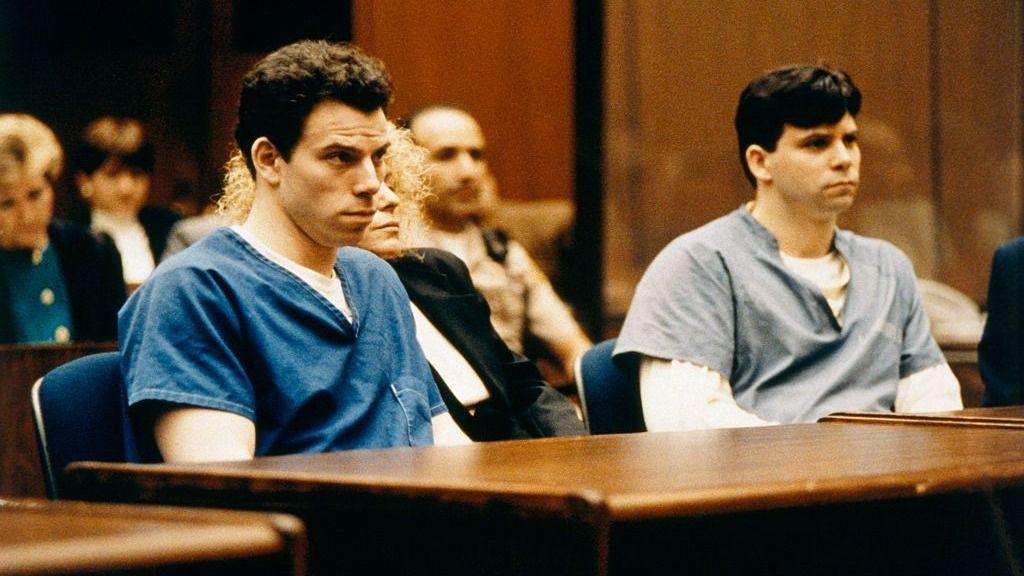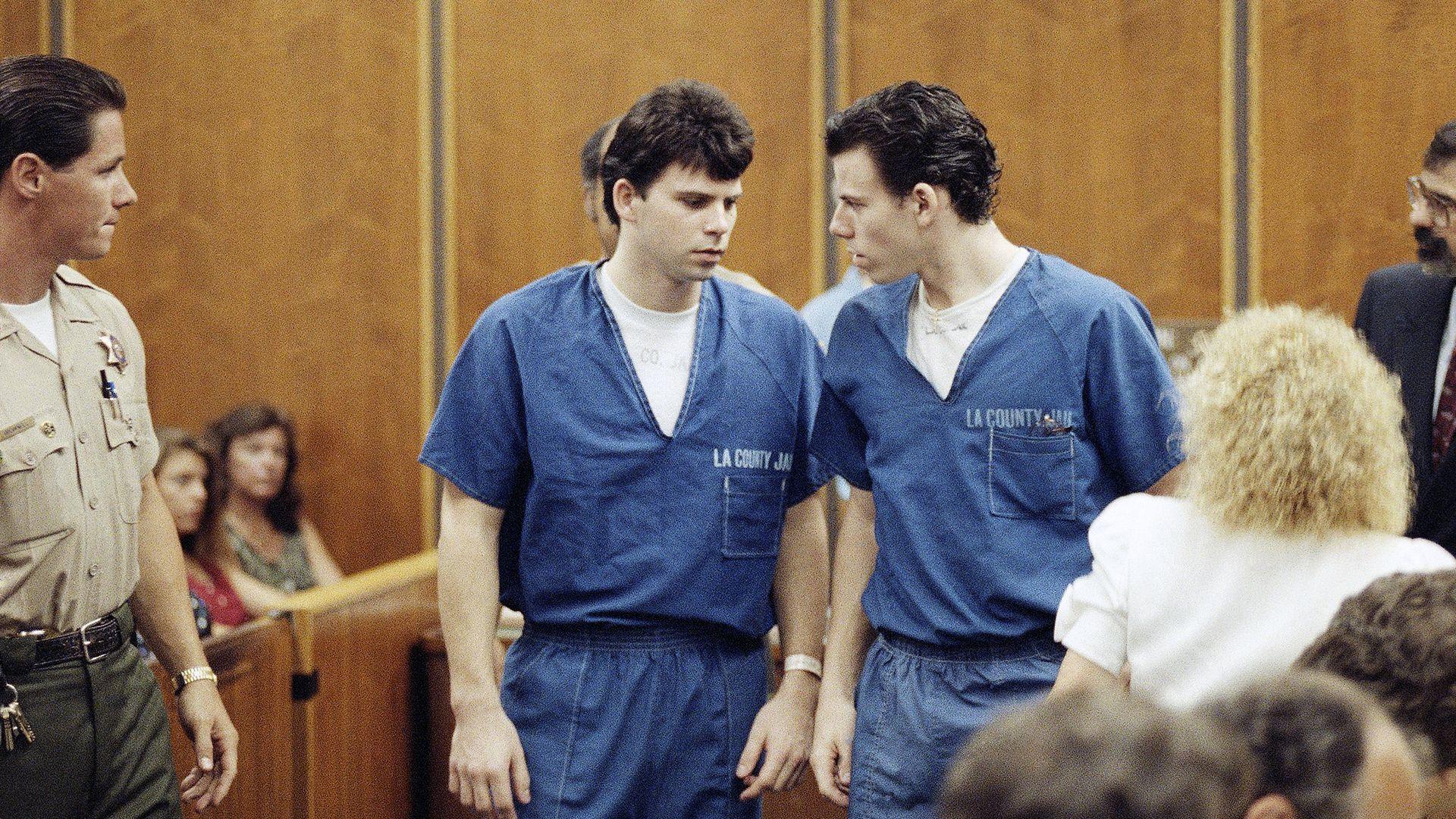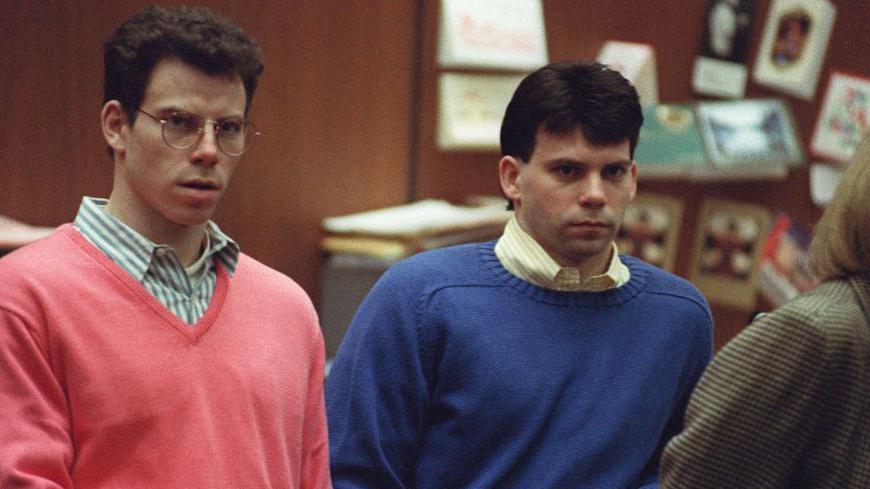Pop culture re-invented the Menendez brothers - now their fate may rest with one man
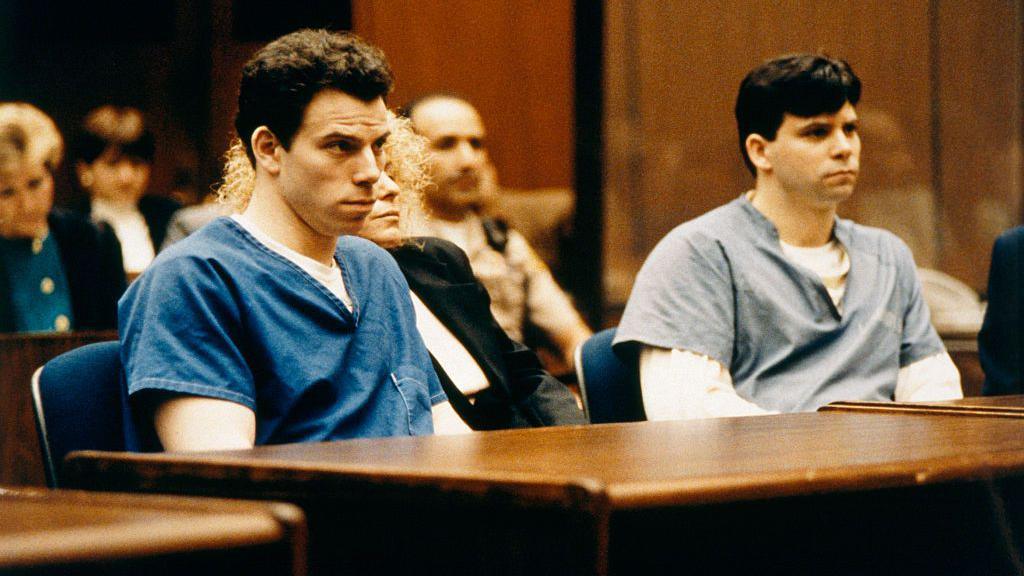
- Published
It was once unthinkable that Lyle and Erik Menendez, the men who murdered their wealthy parents by shooting them 16 times, would get the sympathy and forgiveness of the masses.
Their claims of sexual abuse at the hands of their father were mocked by prosecutors and comedians alike, from late-night TV to jokes at the Academy Awards.
But 35 years later - thanks in part to TikTok, Netflix and stars like Kim Kardashian - the Menendez brothers have a new generation of supporters - many who were not even born in 1989, the year the brothers ambushed their parents with shotguns in their Beverly Hills mansion.
At the time of their trials, the brothers were portrayed as greedy, entitled monsters who went on a $700,000 (£526,0000) spending spree in the weeks after the murders. Now, with a growing understanding of trauma and sexual abuse, many are more sympathetic - and that might just give the brothers a chance at freedom.
This week, a Los Angeles judge reduced the brothers' sentence to include the possibility of parole, which could be granted at a hearing next month.
Their fate will then be in the hands of California's Parole Board and, ultimately, Governor Gavin Newsom, who will be weighing the shifting public opinion about the divisive case with his own political ambitions.
Watch: "Redemption is possible" - Family and attorney of Menendez brothers react to resentencing
How did we get here?
In 1989, Erik and Lyle Menendez burst into their Beverly Hills living room, both toting loaded shotguns, and opened fire on their parents, who were watching television. The crime would go unsolved for months.
They got tickets for the James Bond film License to Kill as an alibi and told law enforcement and members of the news media, who were covering the execution of the wealthy, high-powered couple in their mansion, that perhaps the mafia was to blame.
Meanwhile, they bought a new Porsche, Jeep, Rolex watches and other luxury items with cash from their parents' estate.
They weren't caught until police got word of their admissions to a psychologist.
Even at the time, their crime was divisive - the first trial ended un a mistrial after the jury couldn't reach a verdict. After the second, they were sentenced to life without parole.
During both trials, the brothers were characterised as bad boys and spoiled children who were motivated to kill their parents out of hatred and hopes to acquire their $14 million estate.
Saturday Night Live and other late-night shows mocked the pair's defence in court – including tearful testimony about their alleged sexual abuse, which prosecutors dubbed the "abuse excuse" - and documentary titles from that decade included phrases like "the bad sons" and "American sons, American murderers".
Appeal after appeal was denied but last year, everything seemed to change. New evidence about the alleged sexual abuse had surfaced and Netflix released a drama that captured the attention of a whole new generation. Soon, documentaries about the case included titles with words like "misjudged" and "boys betrayed".
TikTokers discussed the case with their followers. Reality star Kim Kardashian, a criminal justice advocate who has helped free imprisoned people, penned an opinion piece publicly backing their bid for freedom.
"Back then, there were limited resources for victims of sexual abuse, particularly for boys," Kardashian wrote in the NBC piece.
In the 1990s, society did not have the same understanding we do today of trauma, sexual abuse and harassment, Whitney Phillips, a University of Oregon professor who studies true crime, told the BBC. That gap in understanding was especially pronounced for boys who were abused, she added.
But after the MeToo movement, there was more cultural space created for people to speak about these experiences, she said.
"Not only does it create a permission structure," Prof Phillips said of people feeling encouraged to speak out about harassment and abuse, "in some ways it creates an incentive structure to feature stories about trauma".
Adding to that is the change in how the public views criminal justice, with more emphasis on rehabilitation and reducing prison populations instead of the tough-on-crime mentality that dominated Los Angeles at the end of the 20th Century.
"The lock people up forever attitude of the 1990s is fortunately long gone," said Robert Rand, a journalist who met and interviewed the brothers before they were arrested and uncovered new evidence in 2018 - a letter Erik had written as a teenager to a cousin about his father's sexual abuse.
In a documentary Mr Rand produced about the killings, released in 2023, a former member of the boy band called Menudo alleged that the brothers' father, Jose Menendez - who was an executive at RCA Records - had raped him when he was 14 years old. The accusation further bolstered the brothers' claims of abuse.
The new testimonies helped give new life to the brothers' claims, and provided a catalyst for what Prof Phillips called a "hurricane" of interest and support, from the Netflix drama to Kardashian's op-ed.
"The things that get really big online are things that have lots of sources of energy," she said.
Even Lyle Menendez noted the sea change.
"The followers who are younger that are on that sort of TikTok social media generation, they really have tremendous hope," Lyle Menendez said at a court hearing.
"I'm not as hopeless as I was as a 21-year-old, that's for sure. Obviously, I feel more hope when society seems to be understanding these experiences and sex abuse better."
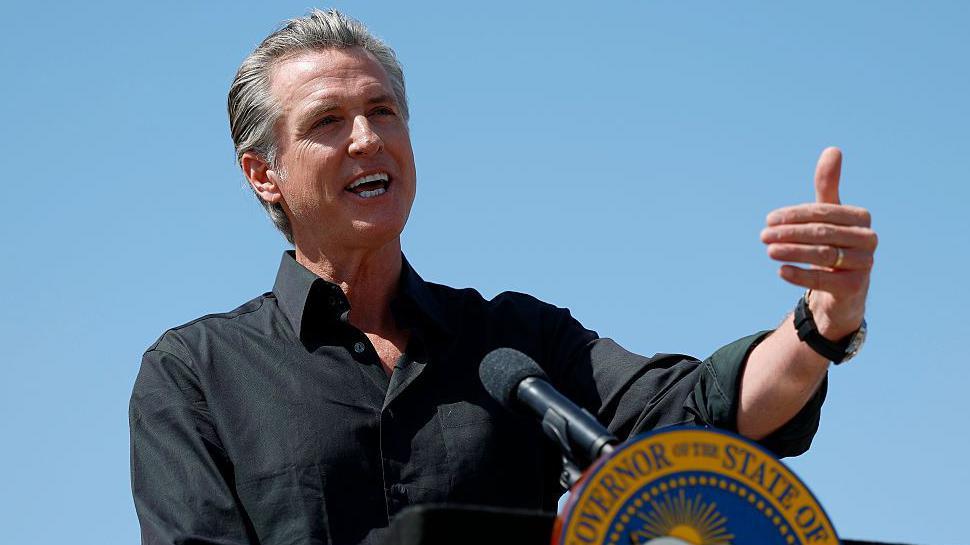
The fate of the brothers rests with California Gov Gavin Newsom, who is thought to be a potential US presidential contender
Where do the Menendez brothers go from here?
The fate of the brothers – regardless of what social media, the courts or California's parole board recommends – ultimately rests with one man: Governor Newsom, who has the power to accept or reject any parole recommendation.
And many believe that man is considering a run for president in 2028.
Since the last election, Newsom has been undergoing a political transformation, shifting from crusading liberal pushing universal healthcare to a more moderate, pragmatic approach, most recently proposing freezing healthcare for undocumented immigrants.
Weighing in on such a divisive case could be "risky", said Pennsylvania-based Republican political strategist Sam Chen.
"Can you imagine a reality TV show of the Menendez brothers while Newsom is trying to run for president? Talk about free campaign airtime," he said. "That would be the worst thing for him."
Although no one knows which way he is leaning, Newsom has mentioned the case several times on social media and on his podcast.
"The question for the board is a rather simple one," Newsom said in February on TikTok. "Do they pose a current, what we call 'unreasonable' risk to public safety."
Mr Rand acknowledged the case is "risky" politically for Newsom.
"You can't get around the elephant in the room: They brutally murdered their parents," Rand told the BBC. "But if you do believe that they were abused and that they suffered from a lifetime of abuse - and there actually is evidence that supports their story - it's a very different situation."
The brothers have not committed violent crimes while in prison, a fact the judge in their resentencing hearing considered, although they did have infractions for using cell phones smuggled into prison.
They've also led productive lives while incarcerated, with Erik founding a hospice programme to help elderly and disabled inmates while Lyle has been working on prison beautification.
Remarkably, every single surviving member of their family – from cousins to aunts and uncles - want the Menendez brothers released, including the surviving siblings of Jose and Kitty Menendez.
"They chose to live their lives with clarity and a purpose of service," their cousin Anamaria Baralt said outside the court after they were resentenced.
If the board recommends parole in June, the governor has 30 days to accept or reject the recommendation. If they are paroled, the brothers will be released likely within five months, according to the California Department of Corrections.
The fact that Gov Newsom ordered the state parole board to conduct a comprehensive risk assessment before the brothers were even deemed eligible for parole has many thinking he's open to releasing them.
"He wants the political cover" of the parole board and court recommendations, said Neama Rahmani, a former federal prosecutor who has been following the brothers' legal saga but is not representing any of the participants.
A year ago, Mr Rahmani never would have predicted the Menendez brothers could be released. Now he thinks they will be free within the next few months.
But it wouldn't be unprecedented for Gov Newsom to reject a high-profile parole recommendation.
Several times he blocked the release of a Manson Family member. And in 2022, Newsom blocked the release of Sirhan Sirhan, the man who assassinated Sen Robert F Kennedy.
As far as the Menendez brothers go, Gov Newsom said on his podcast that he's mulling over the case and he's not planning to watch any of the documentaries or true crime dramas about the case.
"I'm obviously familiar with the Menendez brothers just through the news over the course of many decades, but not to the degree that many others are because of all of these documentaries and all of the attention they've received," he said. "So that won't bias my independent and objective review of the facts."
Related topics
- Published27 February
